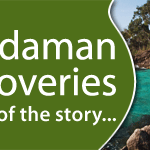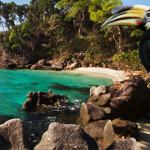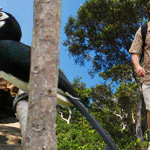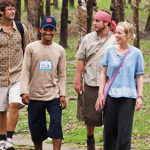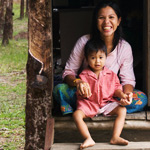Andaman Discoveries Blog
Saturday, August 27, 2011
Phra Thong Community Center

In cooperation with Planeterra, Mangrove Action Project, and Naucrates, we are creating a comprehensive facility that conveys the meaning of life in Ban Lion, and is uniting the community through a common purpose.
Outcomes:
· Renovation and restoration
· Termite control
· Foundation reinforcement and septic tank installation
· Painting
· Furniture and equipment for meeting area and museums
· Architectural design assessment and consulting
Renovation and restoration
Major renovations were undertaken to create a new Center from previously dilapidated structures. An aerial walkway was built to connect the upper level of Center, creating an integrated museum area on the second story. To create the museums, internal walls were removed to allow a maximum amount of display space, and a new door was added.
On the ground floor, a brick entrance path was laid to prevent sand from entering the center, and a concrete floor and shade roof were built to create a shaded meeting area. Other renovations for the entire center included electrical wiring/lighting/outlets, refitting of bathrooms, adding doorknobs & locks, and rust protection for the railings
Termite control
The Center was found to have a quickly spreading termite infestation, and immediate action was necessary to prevent structural damage. After extensive research on the best method for removal, it was determined Bifenthrin would be most effective. Three villagers helped with preparing and spraying the houses. This pesticide was also mixed with gasoline and poured around the base of the houses to prevent them from returning. A checklist was prepared to help avoid future infestations in the Center (see outcomes).
Foundation reinforcement and septic tank installation
The soil under the foundation at the rear of the Center was eroding, and staff coordinated a tractor to push in much-needed soil, and level the area. The foundation is now on stable ground, and the threat of future erosion has been abated.
It was found that the septic tanks for the center were completely collapsed. The septic tanks were purchased and delivered, one per long tail boat, to the island. Initially, attempts were made to remove the old, broken tanks by hand-shovel. The instability of the sandy soil, however, necessitated the use of a backhoe to remove the old tanks and install the new ones.
Painting
Painting was carried out largely by volunteers, over two weeks of labor, with supervision and finishing work by the villagers. Areas painted included the community museum, conservation museum, exhibition room, and community craft store. The community museum and conservation museums included intricate murals of the island and it’s endangered habitats.
Furniture and equipment for meeting area and museums
Materials for the community and conservation museums included shelves, drawers, wooden stands, hanging displays, and specimen racks. For interpretive materials about the local way of life, villagers were also provided poster board, stationery, and photo prints. Equipment for the community meeting area included chairs, a table, a hot water heater, and a small set of coffee cups.
Architectural design assessment and consulting
Sixteen advanced architecture students and their instructors from the Malaya University contributed their expertise by developing plans for the Center. The young architects came with experience in designing their own mangrove research center on the east coast of Malaysia.
After detailed inspection the group suggested an eco-shell superstructure to address water-leakage, wind protection, and heat insulation. Built locally of Nypa palm fronds and bamboo, it would contribute to local livelihood, and reflect the community’s sense of identity.
Other recommendations included a second-story connection for the two buildings, a shading structure along the sides of the buildings, and adding a covered area to the first floor to allow for a large social area, for meetings, discussions, and community social interactions.
Tuesday, August 23, 2011
Holiday For The Kids!
A Little Jungle Hike, Camping, and Environmental Education
 On a fresh Saturday morning, Andaman Discoveries, along with a team of very willing volunteers, decided to give the children from the Southern Thailand Orphanage project and the Youth Group from Ban Lion an amazing holiday. We arranged an adventure-packed weekend for the children to our nearby islands on the Andaman Sea.
On a fresh Saturday morning, Andaman Discoveries, along with a team of very willing volunteers, decided to give the children from the Southern Thailand Orphanage project and the Youth Group from Ban Lion an amazing holiday. We arranged an adventure-packed weekend for the children to our nearby islands on the Andaman Sea. After a hike of about 1.5 hours we arrived at the beach with wild waves crashing onto the shore. Children were running around on the beach playing with the waves. Just as everyone arrived the heavens opened and we had an adventurous wet lunch - food was never eaten this fast!
After a hike of about 1.5 hours we arrived at the beach with wild waves crashing onto the shore. Children were running around on the beach playing with the waves. Just as everyone arrived the heavens opened and we had an adventurous wet lunch - food was never eaten this fast!
After the lunch we came back to our starting point, and the children went for another swim at a waterfall.
After an educational and fun day, the children packed up and headed back to the Orphanage. We hope to see them again soon!
Labels: jungle hike, Koh Phratong, orphanage, southern thailand orphanage
Monday, August 22, 2011
Teaching the Teachers?
Southern Thai Cooking

 After eating delicious food at one of our classes recently, the volunteers had the option to visit the nearby waterfall and swim in the clear cool waters. They also got a chance to visit our beautiful local beach were they relaxed, took pictures and swam in the sea watching the sunset over the clear horizon.
After eating delicious food at one of our classes recently, the volunteers had the option to visit the nearby waterfall and swim in the clear cool waters. They also got a chance to visit our beautiful local beach were they relaxed, took pictures and swam in the sea watching the sunset over the clear horizon.
Labels: Thai food, volunteering Thailand
Friday, August 19, 2011
Summer Volunteering in Thailand
Experiences Giving Back to Children
 “I loved every minute at the placement and regret only coming for two weeks. Although I have seen progress from the children at the Thai/Burmese Junior school, I would have loved to have stayed longer to really reinforce what I taught them in these two weeks and see a significant growth in their confidence and ability to communicate in English, that is my only regret. I have never felt as welcomed as I did in Kuraburi and the Thai/Burmese junior school (without the kindness of the locals, the teachers and the AD staff this trip would not be as amazing as it was). Thank you for everything! I will see you very soon.”
“I loved every minute at the placement and regret only coming for two weeks. Although I have seen progress from the children at the Thai/Burmese Junior school, I would have loved to have stayed longer to really reinforce what I taught them in these two weeks and see a significant growth in their confidence and ability to communicate in English, that is my only regret. I have never felt as welcomed as I did in Kuraburi and the Thai/Burmese junior school (without the kindness of the locals, the teachers and the AD staff this trip would not be as amazing as it was). Thank you for everything! I will see you very soon.”
Susana R, volunteer at the Junior school in Kuraburi, June 2011
 “Volunteering at the Southern Thailand orphanage was a life-changing experience for my Jared and I. We spent a short week with the Home and Life family and within that time, came to regard them as part of our family. The staff are such caring, kind hearted people and have fostered a beautiful, loving environment for the children. It truly is one big family – and they stand true to their word: “A family place of love and learning”. The children are just amazing – they have so much heart and soul, and each one of them looks after their brothers and sisters. We already look forward to returning one day – and this time for longer than a week. Thank you for the opportunity to volunteer with the Southern Thailand orphanage – it was an honour.”
“Volunteering at the Southern Thailand orphanage was a life-changing experience for my Jared and I. We spent a short week with the Home and Life family and within that time, came to regard them as part of our family. The staff are such caring, kind hearted people and have fostered a beautiful, loving environment for the children. It truly is one big family – and they stand true to their word: “A family place of love and learning”. The children are just amazing – they have so much heart and soul, and each one of them looks after their brothers and sisters. We already look forward to returning one day – and this time for longer than a week. Thank you for the opportunity to volunteer with the Southern Thailand orphanage – it was an honour.”
Melanie and Jared C, volunteers at the Southern Thailand Orphanage, July 2011
 “I remember my first day at school, I had to give a short introductory speech during the morning assembly. I was so nervious, but then 800 students welcomed me with a friendly big smile. I felt a lot better! I spent 3 days teaching English and Manderin to 4 different classes. It was hard to explain abstract ideas because of the language barrier, thus I tended to play games with them & let them learn the language in a enjoyable & relaxing way. I believe the most important thing to learn a language is not to be afraid of it & enjoy every single lesson. I am glad that students enjoyed the lessons and teaching days. I know that 3 days teaching may not bring much to them, but I am sure it is good for both of us to know about one's culture and exchange ideas.
“I remember my first day at school, I had to give a short introductory speech during the morning assembly. I was so nervious, but then 800 students welcomed me with a friendly big smile. I felt a lot better! I spent 3 days teaching English and Manderin to 4 different classes. It was hard to explain abstract ideas because of the language barrier, thus I tended to play games with them & let them learn the language in a enjoyable & relaxing way. I believe the most important thing to learn a language is not to be afraid of it & enjoy every single lesson. I am glad that students enjoyed the lessons and teaching days. I know that 3 days teaching may not bring much to them, but I am sure it is good for both of us to know about one's culture and exchange ideas.
Rainy L, volunteer at the Kuraburi high school, July 2011
 “Having no experience with teaching nor with children, I was quite nervious at the beginning. However already from day one these doubts melted away. I basically enjoyed every second of it even though the conditions are hard and you sometimes feel really exhausted. It is a full time job to teach at the Burmese Learning centre, but the children are lovely to be around and I had a lot of fun. I wish i could stay longer!”
“Having no experience with teaching nor with children, I was quite nervious at the beginning. However already from day one these doubts melted away. I basically enjoyed every second of it even though the conditions are hard and you sometimes feel really exhausted. It is a full time job to teach at the Burmese Learning centre, but the children are lovely to be around and I had a lot of fun. I wish i could stay longer!”
Friedel G, volunteer at the Burmese Learning centre, July 2011
Wednesday, August 10, 2011
Forest School & Lodge in Thailand
 July saw the arrival of 9 new students to our Forest School and Lodge project; here the students will receive a first class education up to the age of 18. The school also runs a hospitality center with 4 beautiful lodges that offer training and hands on experience for students interested in this area of work. The benefits of the program equip them with a great understanding of the hospitality field.
July saw the arrival of 9 new students to our Forest School and Lodge project; here the students will receive a first class education up to the age of 18. The school also runs a hospitality center with 4 beautiful lodges that offer training and hands on experience for students interested in this area of work. The benefits of the program equip them with a great understanding of the hospitality field.
We always like to encourage guests and volunteers to use the hospitality center as much as possible, as this gives the children the much needed contact with foreigners, and brings a little fun into the learning element of the program!
In July we had all the rooms booked for our guests from Gap/STA travel who enjoyed the company of the children as well as taking part in the gardening activities at the school. The school is trying to be as self sufficient as possible by growing their own rice and vegetables. They also have a Palm Oil plantation that helps them to generate much needed income.
“I had a great time at the Forrest lodge and school, the children were great to spend time with the staff, these were very accommodating and the room that we stayed in was amazing.” Andrew S from the UK, visited the school in July 2011
“Loved all of the trip. We packed many activities in and I really learned a lot. My Favorite part was the yaowawit school and I am planning on coming back. Thanks for the amazing time!:)” Cara Shore from the UK, visited the school in July 2011
Labels: Forest School Thailand
Subscribe to Comments [Atom]

